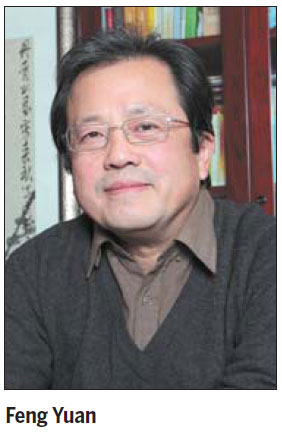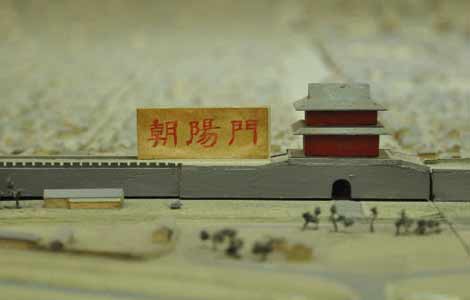Artistic frontiers
Updated: 2013-08-25 09:18
By Li Fusheng (China Daily)
|
|||||||||||

In 1969, fledgling young talent Feng Yuan was sent from Shanghai to Heilongjiang, but the saga only enriched his work, Li Fusheng reports
Feng Yuan is a tireless explorer in the world of art, a Chinese painting master who blazed a way of his own.
Born in Shanghai in 1952, Feng was an avid art lover from childhood and for eight years taught himself to paint pictures.
But art was set aside when the 17-year-old Feng was sent to faraway Heilongjiang province in Northeast China in 1969 as one of the so-called educated youth relocated during the "cultural revolution" (1966-76).
If not for his fascination, Feng like many others might have found himself in another occupation in the cold, barren region.
But the eight years he spent in Heilongjiang before he was admitted to the China Academy of Art in 1978 made him a hardy soul. It also lent him a perspective on people, especially the underclass.
"Art should focus on people, their emotions and their life. Art will become soulless if it puts too much emphasis on form," said Feng.
While steadfast in his beliefs, Feng is open-minded as illustrated in his painting from different periods.
Most of his works in the early 1980s, including a series titled Defending the Yellow River (1984), have heroes as subjects, which is a clear indication of his reflection on history.
Such subjects prevailed in his work until the mid-1980s and the early 1990s when Feng began to explore the possibilities of expressing thoughts and cultural images in abstract expression and symbolism.
In works created in that period, such as the Peking Opera Masks Series (1989), one can see the change from traditional concepts and forms, to random imagination as well as efforts to challenge and detach from the past.
Feng also advocated reforming traditional Chinese painting in his articles written in that period. In A Choice That Does Not Betray, he called for efforts "to reconsider the essential meaning of Chinese cultural traditions" and "reform the spiritual core of traditional Chinese painting to modernize it".
Though Feng did not give up his exploration of such things as abstract expression, in the 1990s signs of a return to the real world and traditional style was evident in his work.
But it was not simply a replication of the early 1980s, rather a creative continuation of it. Telling examples include Sun Yat-sen and China (1996) and Urban Life (1998).
To understand Feng's art, his works featuring people in everyday life are crucial. His accomplishment in portraiture relies on not only his unique perspective and skillful brushwork, but also the realistic concept he has borrowed from the Western world.
Art knows no borders, said Feng. Chinese art also has a lot to offer for its Western counterpart, he said.
"We can compare Huang Binhong's works with Impressionist paintings and we can compare Picasso with Qi Baishi. Such comparisons will surely yield good results."
Professor Feng Yuan is now vice-president of the China Federation of Literary and Art Circles and vice-president of China Artists Association. He before served as vice-president of the China Academy of Art and curator of the National Art Museum of China.
Related Stories
Purely artistic 2013-08-18 07:49
An artist's self-discovery in Tibet 2013-08-16 10:27
Contemporary artist not giving up 'independence' 2013-08-15 23:17
Tangka Art Exposition opens in Lhasa 2013-08-05 10:54
Australian artists working in China win Australian Arts in Asia Awards 2013-08-02 11:09
Master of his art passes away 2013-07-29 13:01
Today's Top News
Report of starving Chinese crew members proves untrue
Joint sea drill shows improved ties
Rainstorms and floods wreak havoc
UN to probe alleged chemical attack
Bo insists he did not abuse power
Experts call for details on rumor cases
Market regulators need to fix loopholes
Trending news across China
Hot Topics
Lunar probe , China growth forecasts, Emission rules get tougher, China seen through 'colored lens', International board,
Editor's Picks

|

|

|

|

|

|





